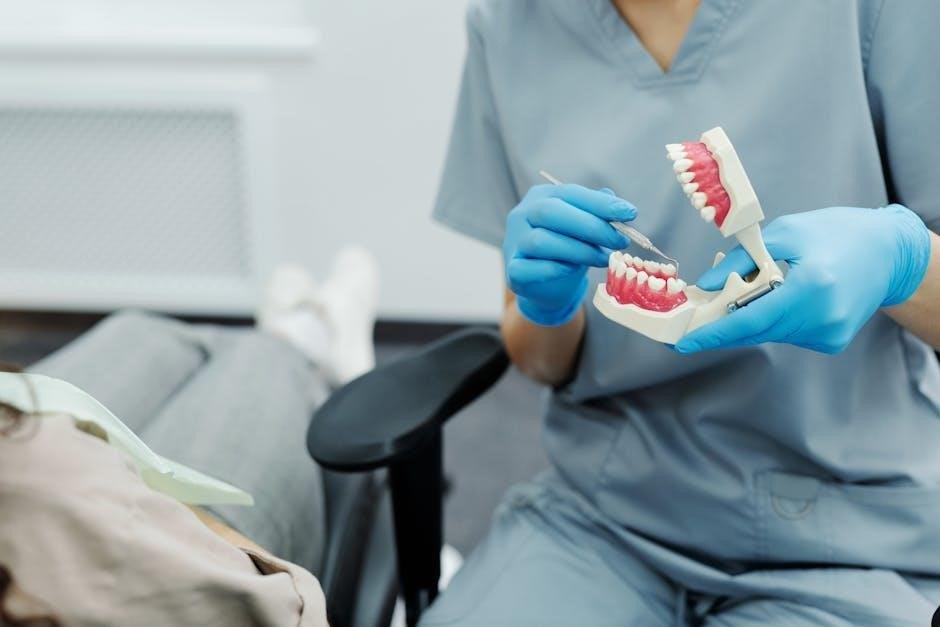Pre-Operative Instructions for Wisdom Teeth Removal
Prepare by fasting for 8 hours prior to surgery and avoid smoking for at least 12 hours. Remove contact lenses, jewelry, and accessories. Wear loose, comfortable clothing and follow medication instructions provided by your doctor. Brush your teeth gently the morning of surgery but avoid swallowing water or toothpaste.
Fasting and Hydration Guidelines

It is essential to follow strict fasting guidelines before wisdom teeth removal to ensure a safe procedure. Patients should avoid eating or drinking anything, including water, for at least 8 hours prior to surgery. This fasting period helps prevent complications during anesthesia. For morning surgeries, no food or drink should be consumed after midnight. If your surgery is scheduled in the afternoon, avoid eating or drinking 8 hours before the appointed time. Clear liquids like water may be allowed up to 6 hours before surgery, but this should be confirmed with your doctor. Avoid chewing gum, mints, or candies, as they can interfere with fasting requirements. If prescribed pre-medication, take it with a small sip of water only if instructed. Brushing teeth gently the morning of surgery is permitted, but do not swallow toothpaste or water. Adhering to these guidelines ensures your safety and the success of the procedure.

Medications and Supplements to Avoid
It is crucial to avoid certain medications and supplements before wisdom teeth removal to minimize risks during surgery. Blood thinners, such as aspirin or warfarin, should be discontinued if approved by your doctor, as they can increase bleeding during the procedure. Non-steroidal anti-inflammatory drugs (NSAIDs), like ibuprofen, may also need to be avoided. Herbal supplements, including vitamin E, fish oil, and garlic, should be stopped at least one week before surgery, as they can interfere with blood clotting or anesthesia effectiveness. Inform your doctor of all medications, vitamins, and supplements you are taking to ensure a safe procedure.
If prescribed, take pre-medication as directed, such as antibiotics like amoxicillin, which may need to be taken 1 hour before surgery with a small sip of water. Always follow your doctor’s specific instructions regarding medications and supplements to avoid complications.
Smoking and Alcohol Restrictions
Smoking and alcohol consumption must be avoided prior to wisdom teeth removal to ensure a safe and successful procedure. Smoking should be stopped at least 12 hours before surgery, though some guidelines recommend abstaining for up to 72 hours. Smoking can impair breathing during sedation and increase the risk of complications. Additionally, alcohol should not be consumed for at least 24 hours before the procedure, as it can interfere with anesthesia and prolong recovery time.
Both smoking and alcohol can affect blood flow and healing, potentially leading to a longer recovery period. It is essential to adhere to these restrictions to minimize risks and promote optimal outcomes. Inform your doctor if you smoke or consume alcohol regularly, as this may influence your anesthesia options or surgical planning. By avoiding these substances, you can help ensure a smoother procedure and faster recovery.
Oral Hygiene Practices Before Surgery
Proper oral hygiene is crucial before wisdom teeth removal to reduce the risk of infection and promote a smooth recovery. Patients are advised to brush their teeth gently the morning of the procedure using a soft-bristled toothbrush and fluoride toothpaste. However, it’s important not to swallow any water or toothpaste during this process. If prescribed, an antibacterial mouthwash may be recommended to reduce bacteria in the mouth.
Avoid using harsh or abrasive oral care products, as they may irritate the gums or surrounding tissues. Refrain from flossing or using an oral irrigator near the wisdom teeth area, as this could cause unnecessary irritation or bleeding. Maintain good hygiene practices to ensure the surgical site is as clean as possible, which can help minimize post-operative complications.
Your dentist or oral surgeon may provide specific oral hygiene instructions tailored to your needs, so be sure to follow their guidance carefully. Keeping your mouth clean before surgery is a key step in preparing for a successful procedure and recovery.

Clothing and Personal Items to Prepare
Choose loose-fitting, comfortable clothing for your wisdom teeth removal surgery to ensure ease and accessibility for medical staff; Opt for a short-sleeved or sleeveless shirt to facilitate intravenous access. Avoid wearing tight or restrictive garments that may cause discomfort during or after the procedure.
Remove all jewelry, including earrings, necklaces, and rings, as these can interfere with surgical procedures or anesthesia equipment. Contact lenses should also be taken out and replaced with glasses if needed. Watches and other accessories should be left at home to prevent any complications.
Bring necessary personal items such as insurance cards, identification, and a list of medications. Wear comfortable shoes and consider bringing a change of clothes for recovery, especially if you plan to rest at the clinic. Avoid bringing valuables or unnecessary items to minimize distractions and ensure a smooth experience.
By preparing appropriate clothing and personal items, you can ensure a more comfortable and efficient surgical process. Always follow specific instructions provided by your oral surgeon for any additional requirements.
Arrival and Check-In Procedures
Plan to arrive at least 15-20 minutes before your scheduled appointment to complete any necessary paperwork and preparation. Bring a valid form of identification, insurance cards, and a list of current medications. If you are under 18, a parent or legal guardian must accompany you to sign consent forms.
Ensure you have a responsible adult with you to drive you home after surgery, as anesthesia effects may impair your ability to operate a vehicle. Inform the clinic staff of any changes in your medical condition or recent illnesses. During check-in, confirm your personal and medical details for accuracy.
Be prepared to discuss your medical history, allergies, and any concerns with the surgical team. Remove any unnecessary personal items and store them securely. Follow any last-minute instructions provided by the staff to ensure a smooth process.
Avoid bringing unnecessary valuables or large bags. Stay calm and ask questions if you need clarification. Timely arrival and proper check-in help ensure the procedure starts on schedule and runs smoothly.
Anesthesia and Sedation Preparations
Follow specific fasting guidelines based on the type of anesthesia or sedation planned for your procedure. Typically, you must avoid eating or drinking anything, including water, for 8 hours prior to surgery. If you are scheduled for morning surgery, ensure no food or drink is consumed after midnight.
Brush your teeth gently the morning of surgery, but avoid swallowing any water or toothpaste. If prescribed pre-medication, such as antibiotics, take them as directed with a small sip of water. Inform your doctor of any medications or supplements you are taking to avoid complications.
If IV sedation is planned, arrive with a responsible adult to accompany you home, as you will be unable to drive or operate machinery for the rest of the day. Discuss your medical history, allergies, and any concerns with the anesthesiologist before the procedure begins.
Be prepared to follow all instructions provided by your doctor or anesthesiologist to ensure your safety and comfort during the procedure. Proper preparation will help minimize risks and ensure a smooth recovery.
Contact Lenses, Jewelry, and Accessories
Remove contact lenses before surgery to prevent discomfort or complications. If you wear glasses, bring them along but be aware they may need to be removed during the procedure. Avoid wearing any jewelry, including earrings, necklaces, bracelets, or rings, as these can interfere with medical equipment or pose a risk during anesthesia.
Take out all piercings, especially those near the face or mouth, to ensure your safety and comfort. Remove watches, hair accessories, or any other items that could obstruct the surgical area. If you have long hair, consider tying it back securely to keep it out of the way.
Bring a case for contact lenses if you need to store them during surgery. Avoid wearing loose or bulky accessories that may cause discomfort or interfere with the procedure. By removing these items, you help ensure a smooth and safe experience during your wisdom teeth removal.
Post-Surgery Care and Recovery Planning
Plan for a quiet recovery period at home with a responsible adult to assist you for at least 24 hours. Arrange for someone to drive you home and stay with you during the initial recovery phase.
Rest with your head elevated using pillows to reduce swelling and bleeding. Avoid strenuous activities, bending, or lifting for 24-48 hours. Use ice packs on the cheeks near the surgical sites to minimize swelling.
Stick to a soft-food diet, such as yogurt, soup, or mashed potatoes, for the first few days. Avoid hot, spicy, or sharp foods that could irritate the surgical sites. Stay hydrated by drinking water or clear fluids slowly and carefully.
Follow your doctor’s instructions for pain management, including prescribed medications. Do not smoke or use a straw, as this can dislodge the blood clot and delay healing. Monitor for signs of complications, such as excessive bleeding or swelling, and contact your doctor if concerns arise.
Schedule a follow-up appointment to ensure proper healing and address any questions or issues. By planning ahead and following these steps, you can promote a smooth and comfortable recovery after wisdom teeth removal.

Final Reminders and Emergency Contacts
Double-check that all pre-operative instructions have been followed, including fasting, medication adjustments, and avoiding smoking or alcohol. Ensure a responsible adult is available to escort you home and assist during recovery.
Confirm your arrival time and check-in procedures. Bring any required documents, insurance cards, or payment methods. Wear comfortable, loose-fitting clothing and remove contact lenses, jewelry, and accessories before surgery.
Keep your phone nearby with important contacts saved, such as your doctor’s office and emergency services. Program the number of your surgeon or the clinic in case of post-surgery concerns or complications.
Plan for a quiet, restful environment at home, with essentials like ice packs, medications, and soft foods easily accessible. Avoid making important decisions or operating machinery for 24 hours after anesthesia.
In case of severe symptoms like heavy bleeding, difficulty breathing, or intense pain, seek immediate medical attention. Having a well-organized plan and emergency contacts ensures a safe and smooth experience.
